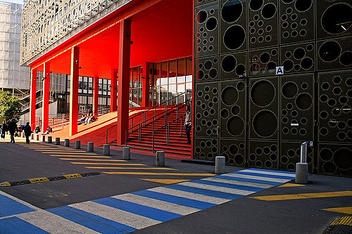Tuition fees in France

Because the French government subsidizes higher education, its cost for students is relatively low.
Tuition rates in public institutions
Choosing to study in France means gaining access to high-quality programmes designed for a wide range of student interests. Tuition fees are low in public Higher education institutions because the French government subsidizes higher education. The true cost of education is the same as it is elsewhere in the world—around €10,000 a year. The difference is that in France the government assumes a large share of that cost.
Tuition fees for academic year 2025/26
For European students (nationals of a member country of the European Union, the European Economic Area, Andorra or Switzerland)*
The French government will continue to pay most of the cost of your degree programme in a public institution of higher education. Tuition charges for the academic year 2025/2026:
- €178 per year at the licence (bachelor) level
- €254 per year at the master level
- €628 per year in a school of engineering**
- €397 per year at the doctoral level
* Some non-EU students pay registration fees identical to those paid by French and EU students based on their status or the degree for which they are studying. These are:
- students who are residents of Quebec,
- international students who hold a long-term residence card or students who have declared their taxable household or have been associated with a taxable household in France for more than 2 years,
- students who benefit from refugee status or subsidiary protection, or children of recipients of such statuses,
- international students enrolled within a doctoral programme, within a HDR (authority to supervise research) and students in the 3rd cycle of their medical, dental and pharmaceutical studies,
- international students enrolled in a 'classe préparatoire aux grandes écoles' (preparatory class for Grandes Ecoles), whatever their nationality, and with dual enrolment in a university degree course,
- students enrolled within a public higher education establishment that falls within the scope of the MESR, at all levels (Bachelor's, Master's, Doctorate) for the 2018/2019 academic year,
- students enrolled in a centre for the study of French as a foreign language (français langue étrangère, FLE) in France prior to the commencement of the 2019/2020 academic year.
** Except for programmes begun after 1 September 2018 at the Ecole Centrale in Lille, Lyon, Marseille, and Nantes, and at the Ecole des Mines in Nancy, where the annual tuition will be €2,613.
Keep in mind…
- The schools of engineering operated by the Ministry of Defense (ENSTA Paris Tech, ISAE, Polytechnique), the Ministry of the Economy (Mines Paris Tech, the schools of the Institut Mines Telecom), and the Ministry of Agriculture (AgroParisTech, Montpellier Sup Agro) have different tuition charges. Check the rates on the websites of the schools that interest you.
- You may also be subject to examination fees when applying to schools of engineering.
For non EU-students
You will be required to pay differentiated registration fees if:
- You are enrolling for the 1st time for a Bachelor's or Master's degree, or for an engineering programme, for the start of the 2025/2026 academic year;
- Within a higher education establishment that falls within the scope of the Ministry in charge of Higher Education and Research;
- Provided that you are not permanently settled in France.
The state will thus cover two thirds of the cost of your training. The total registration fee that you will be required to pay will be:
- €2,895 per year at the licence (bachelor) level
- €3,941 per year at the master level
If you enroll in a degree at Doctorate level at the beginning of the 2025 academic year, the French government continues to assume most of the cost of your education until you complete your degree programme. Your tuition for 2025/2026 will be €397. Non-EU doctoral students are not subject to new differentiated tuition fees.

Which tuition fees according to your situation?
Tuition fees similar to those of French students for…
- Students with the nationality of countries in the European Union, the European Economic Area or Switzerland;
- Students with the nationality of a country that has signed an agreement with France providing for the payment of enrolment fees under the same conditions as French students. This is the case with Andorra and Canada (for students resident in Quebec);
- Non-EU students...
- ... who hold refugee status or who are the recipients of subsidiary protection, and those who have a parent holding one of these statuses.
- ... enrolled in a 'classe préparatoire aux grandes écoles' (preparatory class for Grandes Ecoles), and with dual enrolment in a university degree course;
- ... who hold a long-term residence card or students who have declared their taxable household or have been associated with a taxable household in France for more than 2 years;
- ...already enrolled within a public higher education establishment in 2018/2019, at all levels (Bachelor's, Master's, Doctorate);
- ... enrolled in a centre for the study of French as a foreign language (français langue étrangère, FLE) in 2018/2019;
- ... enrolled within a doctoral programme, within a "HDR" (authority to supervise research) and students in the 3rd cycle of their medical, dental and pharmaceutical studies, with the exception of short cycles;
No tuition fees, whether differentiated or not for…
- Students who come to study in France as part of a partnership agreement between universities that provides for total exemption from enrolment fees (like the Erasmus+ exchange programme in particular);
- Students who have been awarded a French government grant (BGF) ;
- Students who have been awarded a grant from their host institution, providing for total exemption from enrolment fees.
Partial or total exemption for…
Non-EU students who have been granted full or partial exemption from tuition fees by their host institution in France or by the French embassy in their home country.
Differentiated tuition fees for…
Non-EU students that do not fall within any of the situations outlined above:
- Arriving in France at the start of the 2025 academic year and enrolling for the first time in a higher education course at a Bachelor's or Master's level or within an engineering programme;
- Enrolling within a public higher education establishment, under the Ministry of Higher Education. This is the case for all universities, for example. To verify, consult the list of public higher education establishments concerned by the application of the payment of differentiated fees.
Which public academic institutions are affected?
France’s major public postsecondary institutions are listed below. In all of them, a large part of the real cost of education is subsidized by the state. And all of them are covered by the new system of differentiated tuition.
- All of France’s universities
- All 25 institutional groupings
- The three INPs (national polytechnical institutes) in Toulouse, Grenoble, and Bordeaux
- The four écoles centrales in Lille, Lyon, Marseille, and Nantes
- The six INSAs (national institutes of applied sciences) in Lyon, Rennes, Toulouse, Rouen, Strasbourg, and CentreVal de Loire
- The three technological universities in Compiègne, BelfortMontbéliard, and Troyes
- The four ENSs (écoles normales supérieures) in Paris, Cachan, Lyon, and Rennes
- Twenty national institutions, including the Collège de France, CNAM (Conservatoire national des arts et métiers), INALCO (Institut national de langues et de civilisations orientales), and EHESS (École des hautes études en sciences sociales)
- Five French institutions abroad: the French schools in Athens, Rome, and the Far East; the Institut français d'archéologie orientale in Cairo; and the Casa de Velázquez in Madrid
- Twentyfive public research bodies, including CNRS, CNES, CIRAD, INSERM, INRA, and IFREMER
We urge you to check the official government list to verify whether your institution is covered by the tuition system.
Tuition costs in private institutions in France
Tuition in private institutions, and particularly in private business schools, is substantially higher than in public institutions, ranging from €6,000 to €18,000 per year. Check the website of the institution to learn the amount of tuition charged for programmes of interest to you.
18% of all students in France attend private institutions. Private status signifies that the institution was not founded by the state. The level of public funding each receives is variable. In some cases, the state may officially recognize an institution and authorize it to grant national diplomas. In such cases, the government has a say over the instruction offered in those degree programmes, ensuring students of a certain level of service and quality. Among the private institutions recognized by the French government are the five Catholic institutes (in Paris, Lille, Angers, Lyon, and Toulouse) and some schools of business or engineering.




















































